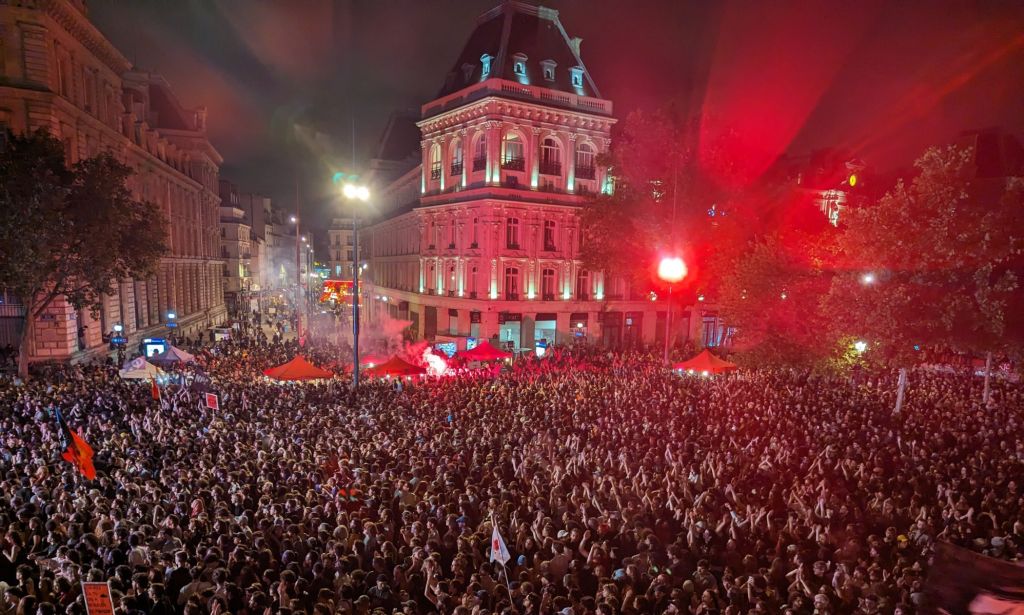Massive anti-fascist protests erupt in Paris after far-right party’s election victory

Thousands took to the streets in Paris to protest far-right Marine Le Pen and her party’s victory in first-round parliamentary elections. (Getty)
Riots have broken out in Paris with voters taking to the streets to protest against the far-right, following the country’s first round of parliamentary elections.
Thousands of people set fire to rubbish, smashed shop windows and launched fireworks across France’s capital after Marine Le Pen’s Rassemblement National (RN) – National Rally – received more than 33 per cent in the first round of voting.
The anti-immigration party made large gains in the south-eastern Provence Alpes Cote d’Azur region but failed to make a breakthrough in Paris.
The left-wing New Popular Front alliance came second with 27.9 per cent of Sunday’s vote while president Emmanuel Macron’s Ensemble centrist coalition trail with just 20.7 per cent.
Riot police clashed with protesters into the early hours of the morning, particularly at the famous Place de la République, where barricades were overturned and dozens of protesters climbed the statue of Marianne, which has been seen as the personification of the French republic since the revolution in the 18th century.
Prime minister Gabriel Attal urged people to vote tactically in the second round of elections, which are due to take place on Sunday (7 July).
In an address outside his Paris residence, he said: “Not a single vote must go to the National Rally. The stakes are clear, to prevent the National Rally from having an absolute majority.”
The RN are predicted to get anything from 260 to 310 seats, with 289 giving an absolute majority.
The leader of the New Popular Front, Jean-Luc Mélenchon, promised to withdraw all his party’s third-placed candidates from the second round of the voting to bolster the NR’s other opponents.
Never before has the Far Right exceeded 20 per cent of the vote in a parliamentary election in France, and a victory next weekend would make this the first time such a party has been in power in France since World War II when the Vichy government was installed by the Nazis.

Le Pen said that Macron’s party had been “wiped out” and claimed that the RN would now be targeting an absolute majority in the second round of elections.
An outright majority would give the party a free hand in the National Assembly – without one their power would be considerably curtailed.
The snap parliamentary elections were called after Macron’s centrist alliance were heavily beaten by the RN in the European Union elections.
When he called the election, Macron said: “For me, who always considered that a united, strong, independent Europe is good for France, this is a situation I cannot countenance. I have decided to give you back the choice of our parliamentary future with a vote.”
But with the RN sweeping a majority of the vote in the first round, Macron’s roll of the dice might not get the result he was hoping for and he could be forced to appoint a prime minister from another party – including the RN’s candidate Jordan Bardella.
The rise of Le Pen’s party is concerning for immigrants, queer people and other marginalised groups in France. She has opposed marriage equality, same-sex adoption and same-sex surrogacy, while her party has faced accusations of homophobia, racism and antisemitism as well as ties to Russia. As recently as last year, Le Pen claimed Crimea “has always been Russian”.
Last night, Le Pen said that while “nothing has been won yet”, the first-round victory showed that voters wanted to “turn the page on Macron’s “scornful and corrosive” presidency.
Many French voters are growing increasingly frustrated by high inflation, the cost of living, the war in Ukraine and the leadership of Macron, who is seen by many to be arrogant and out-of-touch.
“In democracy, nothing is healthier than political change. I call on you to join the coalition of freedom, security and unity. No French person will lose rights, hope is reborn,” Le Pen said.
How did this story make you feel?

